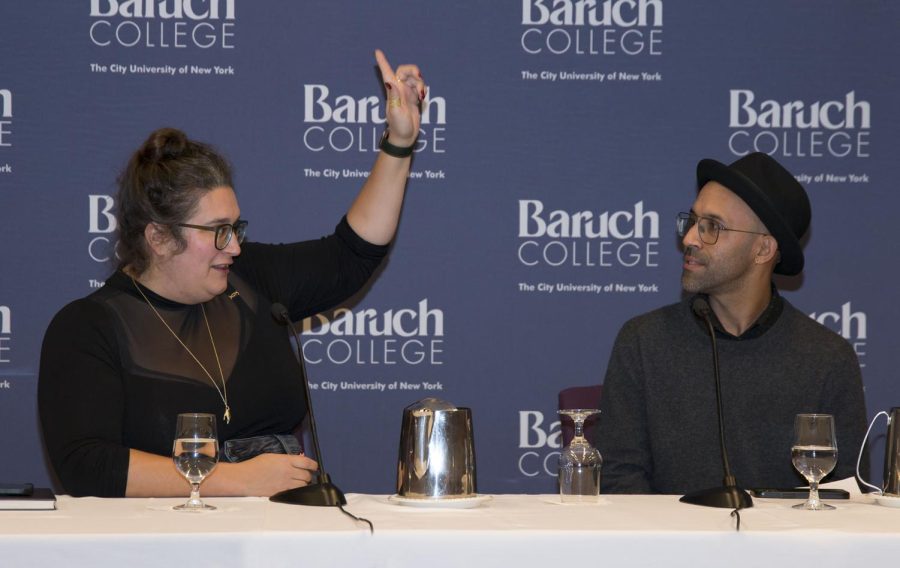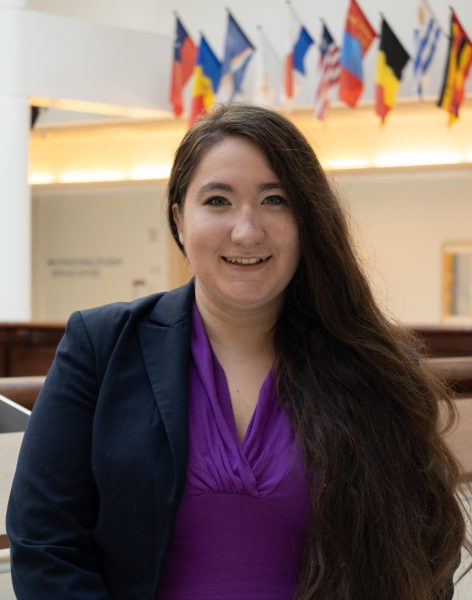Harman Writer-in-Residence discusses identity and genre
November 6, 2022
Carmen Maria Machado, Baruch College’s fall 2022 Sidney Harman Writer-In-Residence, read and reflected on her writing at the Harman program’s reception on Oct. 20.
Machado is the author of the bestselling memoir “In the Dream House” and the award-winning short story collection “Her Body and Other Parties.” Her class at Baruch is focused on writing horror, mystery and suspense.
Debra Caplan, a professor at Baruch’s Fine and Performing Arts Department, introduced Machado and her work by sharing the first time she read one of her stories.
“It reminded me of when I was a little kid and my parents would put me to bed,” Caplan said. “I’d sneak out of bed, and I’d take my book and crack open the door just so and I would take my book and read it in the little bits of light that spilled out from the hallway, knowing that I shouldn’t, knowing that it was surreptitious, knowing that I had other things to do. And yet I just couldn’t put it down.”
Attendees then got to hear Machado read from “The Tour,” part of a new book she is working on, published in McSweeney’s Quarterly. The main character in the story is an author, not unlike Machado, who shifts through different timelines.
At one point in the story, the character wonders if in another timeline she published a fiction book instead of nonfiction.
“With nonfiction, it is always a conversation about pain, about the ways I broke or the ways I let myself be broken,” Machado read aloud to the entranced room.
She returned to the idea of fiction vs nonfiction during the interview portion of the event led by professors Rebecca Salois and Rojo Robles Mejias, hosts of the podcast Latinx Visions.
“With fiction, there’s a real pleasure to being able to take my life and my experiences and what’s happening and have this fictional tool at my disposal, adding magic or thinking about it through a horror lens or one specific genre or certain form,” Machado said. “That’s a real pleasure, it’s what I love about fiction. Nonfiction is more of a challenge because I don’t have those tools at my disposal, I have different tools. I have to think about how do I tease meaning out of my life, which isn’t that all we’re trying to do with our lives?”
Machado said she loves the horror genre because of the way it connects with the concepts behind her work.
“I just feel like it’s a genre that best encapsulates my project, which is the horror of being alive, the horror of having a body, the horror of being a woman, the horror of just being in the world in various iterations and how that manifests,” she said.
Robles Mejias and Salois also asked Machado about the way that she threads her ideas together in a story. For the author, the best way to compare her process is like using a scatter plot graph.
“It’s little bits of data and then there’s a best fit line that goes through it. I can’t think of a better analogy for the process of writing the kind of work that I do than that, where it’s like, there are these pieces of information that we look at that generate a meaning,” she said.
In her collections, Machado said she also likes the individual stories to be connected. Short stories that she enjoys, for example, are often the ones that are “speaking to each other” and“relating to each other.”
Identity is a central theme in many of Machado’s works and she said she explores her own identity through writing.
“Somehow it’s both and it’s like a simultaneous thing that doesn’t quite exist in the same space,” Machado said. “That’s how I feel about my sense of self when it comes to my being Latina, having a relationship with my own sort of presentation, with language, with queerness, with gender. In all these things I feel like I exist on this border periphery, but also all I want to write about is the border. … I’m just right in between and I’m writing into that ambiguity and writing into the ways in which I do not understand myself.”
Machado encouraged those in the audience to embrace having a flexible relationship with their identities.
“The world is falling apart, the world is burning down, it’s very scary, and so I can understand why we would want to have things that we hold on to,” she said. “But I feel like this piece of it, the sense of identity, the sense of self, where we fit in these various categories– it’s delicious how it moves. I wish that we would accept that and understand that.”








